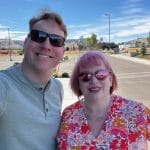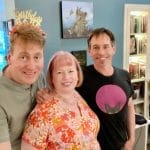New Nature Writing Conference in La Grande, Oregon, Ecology and Hope, and Grateful for Home
- At July 21, 2025
- By Jeannine Gailey
- In Blog
 1
1
New Nature Writing Conference in La Grande, Oregon: Ecology and Hope
Well, we drove through multiple mountain ranges and wildfire smoke both ways in the five-hour drive to and from La Grande, Oregon. Average temperature? 92°F—with red flag-level winds. I’d never seen how empty most of the states of Oregon and Washington are east of the Cascade mountains. Lots of twisty mountain passes, then miles of semiarid scrub, barely a McDonalds or Starbucks to be found. La Grande, almost at the very Eastern end of Oregon, is a little mountainside oasis—a drive-thru Starbucks, little Eastern Oregon University, where the low-res MFA program held its New Nature Writing Conference. We made it there the first day and we were pretty exhausted, the heat and smoke were hard on my MS symptoms, so I barely had any sleep before I had to get up, dress, teach a class on Solarpunk poetry, and then get ready for a reading and Q&A. Immediately after, we turned around and made the five-hour drive home, barely getting through the mountains before the dark settled in, and once again chased by wildfire smoke. The faculty, staff, and students at EOU were warm and friendly, and I felt very welcomed and thankful to be invited to speak—especially on nature and ecology, which are definitely subjects I’m very interested in, but man, physically this trip was hard. (Pics below include Glenn and I in the hot wind of the hotel parking lot, me with the director of the MFA program, and a pic from last week’s birthday celebration.)
- Glenn and I in La Grande hotel parking lot
- Nick Neely and I at EOU
- Glenn’s bday pic with little brother Mike
One question I was asked during my class was “how do you keep your optimism with things like these wildfire evacuations?” (One of my friends texted me during the class she was evacuating her nearby small town.) How do I keep optimism? I wish I could remember how exactly I answered. There are always reasons to hope, however slight, and though I consider myself a realistic optimist—or an optimistic pessimist—it is hard, though imperative, to keep a view of the light, however dim. Hayao Miyazaki—along with Octavia Butler—sort of the godfather and godmother of Solarpunk—have visions of the future that, although dark, contain seeds (Parable of the Sower puns here) of how it is possible to have a more equitable, balanced world where technology, humanity, plants and animals co-exist in peace—usually after an apocalypse. So, maybe it’s around the corner any day now? During the class we discussed the Foxfire Books—rural surroundings mean someone in the class HAD heard of them.
We got home, showered, fell asleep exhausted, and today was mostly recovery (my body definitely showed me it was not happy with me with various symptoms) and unpacking and deciding if such a trip might be doable again. Next time, maybe not in the desert in the middle of July surrounded by wildfires?
 Grateful for Home
Grateful for Home
Grateful to be home with my cats, my own bed, my own (allergy-safe) food, I considered how lucky we were to live in a place with such a moderate climate—today in Woodinville the high was 73°—and to live next to a beautiful lavender farm and have just enough land around my house to have a little garden. Pics here are from this evening, the last legs of the weekend’s Lavender Festival—so we mostly missed it but got there before closing to celebrate.
- Glenn and I in lavender field
- Me with lavender
- with wildflowers
On the journey, I saw a LOT of closed hotels, motels, gas stations, and restaurants—and a LOT of wide-open nothing—no hospitals, no hotels, no restaurants at all. There were no Barnes & Nobles to drop into, no chain restaurants at all along the whole drive. The last place I’d seen with so many closed businesses was Akron on my visit to the University there almost twenty years ago, when the oatmeal-themed cookie shop was the only open store in the entire mall, and the hotel we stayed at was being run by one already-laid-off elderly employee and was being closed after we left. In Ohio, Tennessee, Kentucky—places I’d lived in—there was a lot of poverty, and where my relatives lived in Missouri as well—but I guess I had not really seen it here in the Pacific Northwest (beyond getting lost in a particularly meth-riddled row of closed gas stations and restaurants in Eugene OR on the drive from California back here on one of our moves). Class inequity was really brought home for me on this drive—along with viewing a lot of Trump signs, which you don’t see in and around my home much. Seems like the billionaires in our state could be doing more to help out the rest of the area, but it seems like that isn’t happening. If the farms in Eastern WA and OR are growing our food, but have no restaurants to sell it to—or hospitals to go to if they get sick—or hell, even a rundown mall to see a movie and get a pizza—what is happening to those farmers and the farm workers? I even passed, strangely, a couple of wine tasting rooms tucked into the middle of what seemed to be wasteland, and a few vineyards on sunny hills that were otherwise barren. Woodinville’s wine country never looked so good to me. This is truly my happy place—away from the severe weather of the desert (or even the Midwest) most of the time, green year-round, cloudy enough to keep me safe with my sun allergy, blessed with good hospitals and libraries and bookstores and indie coffee shops and yes, chain restaurants.










 Jeannine Hall Gailey served as the second Poet Laureate of Redmond, Washington and the author of Becoming the Villainess, She Returns to the Floating World, Unexplained Fevers, The Robot Scientist’s Daughter, and winner of the Moon City Press Book Prize and SFPA’s Elgin Award, Field Guide to the End of the World. Her latest, Flare, Corona from BOA Editions, was a finalist for the Washington State Book Award. She’s also the author of PR for Poets, a Guidebook to Publicity and Marketing. Her work has been featured on NPR’s The Writer’s Almanac, Verse Daily and The Year’s Best Fantasy and Horror. Her poems have appeared in The American Poetry Review, Poetry, and JAMA.
Jeannine Hall Gailey served as the second Poet Laureate of Redmond, Washington and the author of Becoming the Villainess, She Returns to the Floating World, Unexplained Fevers, The Robot Scientist’s Daughter, and winner of the Moon City Press Book Prize and SFPA’s Elgin Award, Field Guide to the End of the World. Her latest, Flare, Corona from BOA Editions, was a finalist for the Washington State Book Award. She’s also the author of PR for Poets, a Guidebook to Publicity and Marketing. Her work has been featured on NPR’s The Writer’s Almanac, Verse Daily and The Year’s Best Fantasy and Horror. Her poems have appeared in The American Poetry Review, Poetry, and JAMA.







Poetry Blog Digest 2025, Week 29 – Via Negativa
[…] Jeannine Hall Gailey, New Nature Writing Conference in La Grande, Oregon, Ecology and Hope, and Grateful for Home […]